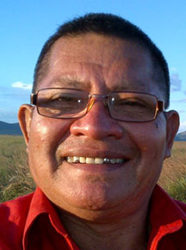A resident of St Ignatius, Rupununi in Region Nine contested as a councillor for the town of Bon Fim when Brazil held its Municipal Elections yesterday.
Wilson Lorentino, 58, who was regional chairman of Region 9 from 2000 to 2014, told Stabroek News in an interview that if he manages to be part of the municipality it would be good for both sides, Brazil and the Rupununi.
Knowing to speak Portuguese as well as Makushi and Wapishiana, the languages of the indigenous people in Bon Fim, is an advantage, he said. He added that he does not “have a bad relationship with the [Brazilian] government.”

Lorentino, who also served as toshao in St Ignatius for 10 years, is a candidate for the Solidaridade (Solidarity) Party. He is confident of being elected because he is well-known among the people.
Asked how he could contest while living in Guyana, Lorentino said he has a fixed address in Bon Fim, Brazil.
He said he was invited by Mayor of Bon Fim, Lisete Spies for a meeting and was asked if he wanted to take up the challenge and he agreed. Following that, “They had a convention of the party and I won…,” he added.
He said too, “The party’s committee has an office in Bon Fim and I go there every day.” In preparation for the elections, Lorentino has been out campaigning and meeting with a lot of people.
To add to his credentials, he served in the Brazilian army as the medex from 1983 to 1990 after taking up residence in Brazil in 1982.
“Every documented Brazilian has to serve the army for one year but I decided to stay on,” he told this newspaper.
Having lived in Brazil for 25 years, he said, “I learnt a lot and decided to return and contribute to my country.” He added too that he moved back because “that’s my home and everyone likes to be at home when they get old.”
Speaking directly about his plans as councillor, Lorentino said he “would help the people from both sides,” in terms of “access to education.”
He would also develop a plan on how to work together to improve tourism on both sides.
He pointed out that, “There are times when nobody in Brazil represents the people from Rupununi.”
He added: “All the Amerindian communities in Brazil are different, in terms of acquiring land. Although there is a body that looks after them they still need help in other areas.”
He also feels he can play an important role in assisting the youth by setting up projects for them to enhance their skills.




